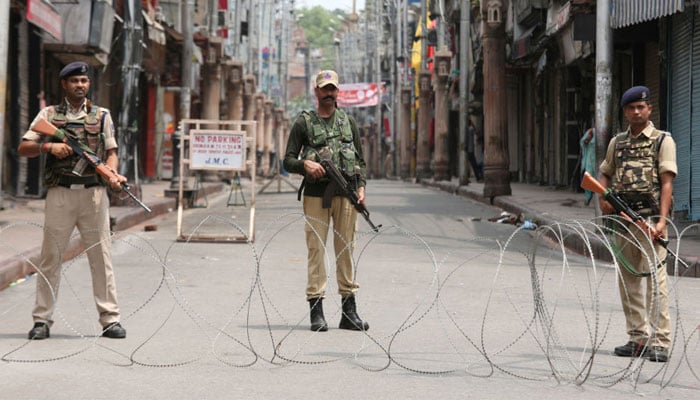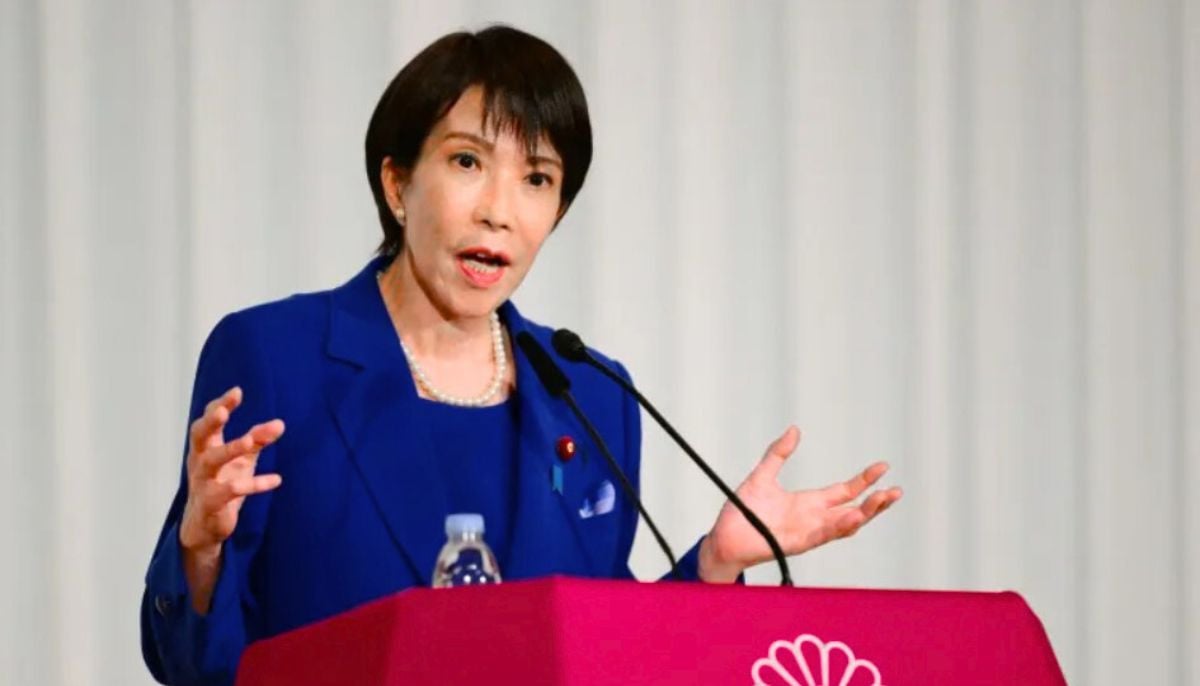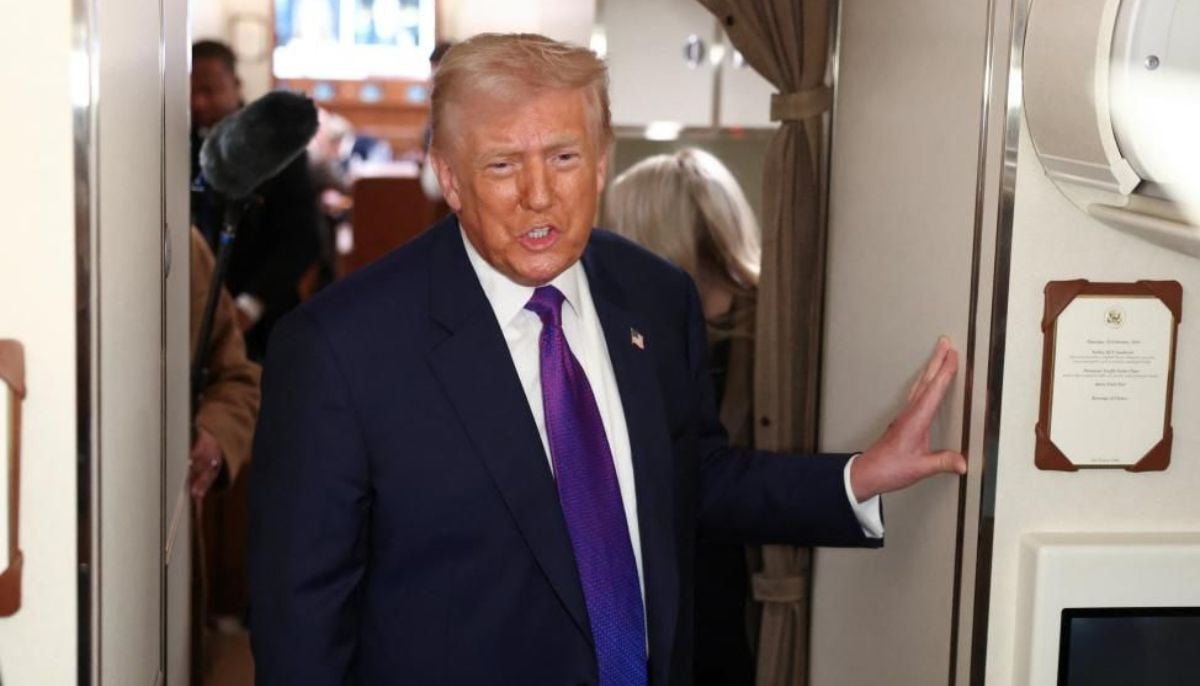American press slams India's move to scrap Occupied Kashmir's special status
The New York Times' Editorial Board called New Delhi's move, which was accompanied by a huge security clampdown, as "dangerous and wrong," and said, "Bloodshed is all but certain, and tension with Pakistan will soar.
NEW YORK:A leading American newspaper has denounced Indian government decision to strip Indian occupied Kashmir of its semi-autonomous status and called for preventing "India’s folly from escalating into a perilous and unpredictable regional crisis.
In an editorial, The New York Times' Editorial Board called New Delhi's move, which was accompanied by a huge security clampdown, as "dangerous and wrong," and said, "Bloodshed is all but certain, and tension with Pakistan will soar.
"Other newspapers also decried the decision, saying it could have extremely dangerous consequences for the region.
"The United States and China must not allow Kashmir to become a pawn in their ongoing disputes; on the contrary, the United States, China, the United Nations and other powers with influence over India and Pakistan must urgently do what they can to prevent India’s folly from escalating into a perilous and unpredictable regional crisis," The New York Times stressed in the editorial.
The editorial said: "The Indian government knows how incendiary its actions are, which is why, before making the announcement on Monday, it ordered tens of thousands more troops into Kashmir, put major political figures under house arrest, ordered tourists to leave, closed schools and cut off internet services.
"The government claimed it was acting to prevent a planned terrorist attack.
But Prime Minister Narendra Modi and his governing Bharatiya Janata Party, deeply rooted in Hindu nationalist ideology, have long made no secret of their intention to revoke the articles in the Indian Constitution granting the predominantly Muslim Kashmir a special status — a move the BJP sees as 'correcting a historical blunder.
'The United Nations recommended holding a referendum to let Kashmiris decide their fate, but that never happened.
"In this volatile stew, India’s latest action provoked instant vows of resistance.
The Kashmiris are especially incensed by the lifting of a ban they had long imposed on the purchase of land by nonresidents, to prevent their land from being bought up by Indians.
"There will be chaos if our identity is compromised," vowed Mehbooba Mufti, a former chief minister of Jammu and Kashmir.
In neighbouring Pakistan the sabers were quick to rattle.
"Pakistan will exercise all possible options to counter the illegal steps," declared the Pakistan Foreign Ministry, while Shahbaz Sharif, the leader of the political opposition, thundered that “Kashmir is the jugular vein of Pakistan, and anyone laying a hand on our jugular vein will meet a frightful end.
"The fray is not without global implications.
Under President Trump, the United States has shifted its favours from Pakistan, a longtime recipient of American aid, to India, which the administration perceives as a bulwark against China.
China, meanwhile, has become an ally and financial patron of Pakistan.
"There is still a good chance that the changes to the Constitution will end up before India’s Supreme Court.
But the fires are already lit.
" Writing in The Washington Post, Hafsa Kanjwal, an assistant professor of South Asian history at Lafayette College in Easton, Pennsylvania, said, "Monday marked a devastating turning point in India’s long-standing occupation of Kashmir," referring to the Modi government''s decision to revoke the special status of Kashmir.
"As a number of Indian historians and legal experts have noted, the presidential order is essentially unconstitutional.
Article 370 is the only legal link between India and the disputed state; for it to be revoked, it has to be approved concurrently by the Jammu and Kashmir constituent assembly, which was dissolved in 1956," she wrote.
"But dramatic shift in policy came amid a brutal crackdown in a territory that already holds the title of being one of the most militarized in the world.
India has deployed an additional 35,000 troops, ordered tourists, pilgrims and journalists to leave, and implemented a curfew.
It also arrested not only Kashmir’s pro-freedom leaders, but also leaders of the varying client regimes it has installed in the recent past," .
For days, people were gripped with fear and uncertainty as they tried to determine their fate.
Even as the announcement was made, Kashmiris were kept in the dark because of a total communications clampdown, with Internet and mobile services blocked.
"Is this how the world’s largest democracy operates?" Ms. Kanjwal asked.
She wrote, "This move highlights the ways in which India is quickly descending to an authoritarian state, only interested in its expansion and securing power — and one that will flout international law and its own constitution to achieve these ends.
"Today’s announcement comes as the fulfillment of the Indian state’s established imperial designs in Kashmir, and especially the long-held view by right-wing Hindu nationalist parties in India since the time of partition to remove Kashmir’s special status and fully annex it.
What this moment illuminates, however, is the stark reality of the colonial occupation in Kashmir.
"For the past seven decades, India has used every possible excuse to suppress Kashmiri political aspirations.
The Indian National Congress, knowing that it had a very unstable position in Kashmir, used the carrot of autonomy to rein in pro-freedom aspirations.
For years it was able to hide behind a discourse of democratic elections (mostly rigged), development or Pakistani interference.
After 9/11, there were the declarations that the freedom movement in Kashmir was part of the war on terrorism, which India was confronting domestically alongside its allies.
Today, with a right-wing Hindu nationalist government in power, one emboldened by a recent electoral victory, the farce is off the table.
"If India has already eroded Kashmir’s autonomy over time, why is this particular move important? There is another provision in the Indian Constitution, Article 35A, which gives the local Kashmiri state the right to define who is a ''permanent resident'' of the state.
Permanent residents are able to own property or buy land.
This was a condition that the pro-accession local leadership insisted upon to protect Kashmir’s Muslim-majority status, and was the last thing Kashmiris were holding onto to preserve some semblance of their nationhood.
"But this has changed.
Indians can now buy property and land in Kashmir, and drive out the local population.
"Thus, what is at stake in this unconstitutional move is the beginnings of a settler colonial project in Kashmir, one similar to Israel’s in the Palestinian territories.
To be sure, the land was already populated by the Indian army — over half a million strong — who had taken over huge swaths of land with their cantonments, camps and bunkers.
But now the ruling party can set in motion its long-term plan to populate the region with enough Hindu settlements to make the current Muslim majority’s political aspirations for freedom obsolete.
"The intent here is to change the demographics of Kashmir from a Muslim-majority state to one that has a Hindu majority.
This process could entail ethnic cleansing.
"Over the next few weeks, the situation in Kashmir will be incredibly tense.
Kashmiris will not be reigned in easily, and they will protest.
The cycle of violence will continue, as these protesters will be met with Indian bullets.
"This is a lesson that India has not been able to realize over time.
Just as British rule in India was not able to last in the face of the thirst for freedom, so too will the violence inherent in this colonial occupation meet resistance.
For Kashmiris who have shown resilience and steadfastness in the face of a 70-year colonial project and brutal occupation, the aspirations for freedom will be even stronger.
"Writing in The Intercept, an online publication, journalist Murtaza Hussain said that India's move on Kashmir potentially sets the stage for a "major new conflict.
"The abrupt escalation caused widespread alarm," he wrote.
"In addition to the military deployments and arrests, a curfew has been imposed on civilian movements.
Internet and mobile phone access for Kashmiris has been completely cut off.
Tourists have been ordered out of the state, and the Indian government has alleged the existence of terror threats against religious pilgrims, who are in the province to visit the famous Amarnath shrine complex.
Taken together, the moves seem to be a clear preparation for possible violence.
"The government would not have taken all these steps if they didn’t have a big plan in the works.
All this also occurs against a backdrop of a slowing economy and rising nationalism within India.
Taking a hard line on Kashmir offers Modi a chance to burnish his populist credentials.
Modi’s May reelection was widely seen as representing a definitive shift in Indian politics toward the religious right, a portentous change in a country that has long taken pride in its secular democratic tradition.
-
Milo Ventimiglia recalls first meeting with Arielle Kebbel on the sets of 'Gilmore Girls' amid new project
-
Leading astrophysicist shot dead at southern California home
-
Will Savannah Guthrie ever return to 'Today' show? Here's what insiders predict
-
Amazon can be sued over sodium nitrite suicide cases, US court rules
-
Patrick Dempsey reveals Eric Dane's condition in final days before death
-
Epstein estate to pay $35M to victims in major class action settlement
-
South Korea’s ex-President Yoon issues public apology after being sentenced to life over martial law
-
Trump officially directs US agencies to identify and release files on extraterrestrial life












